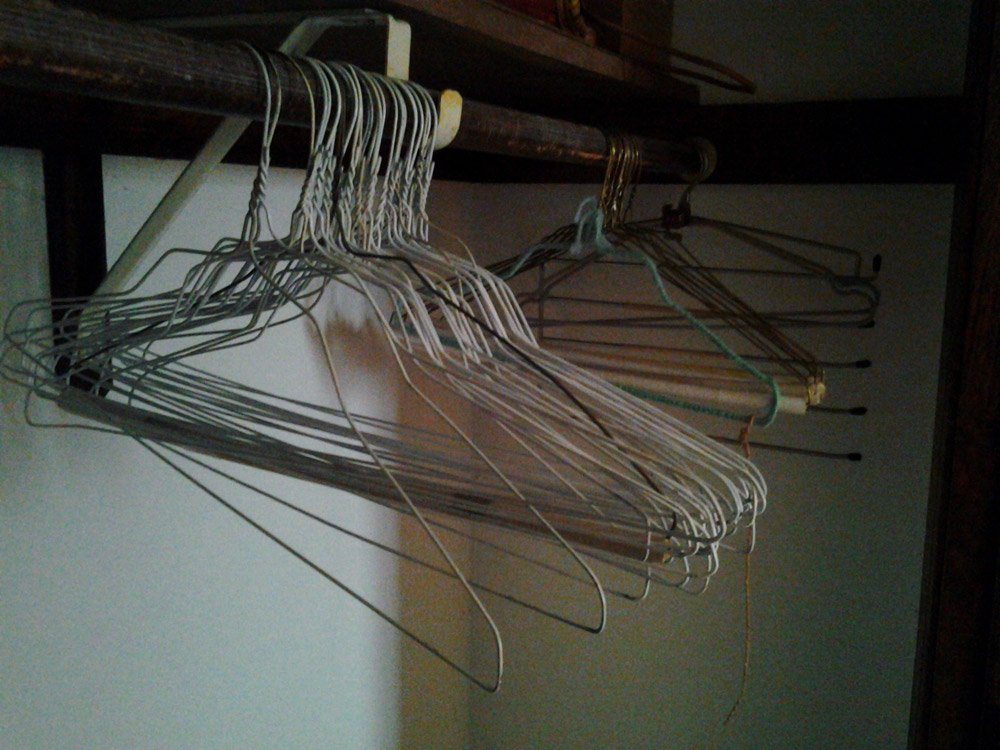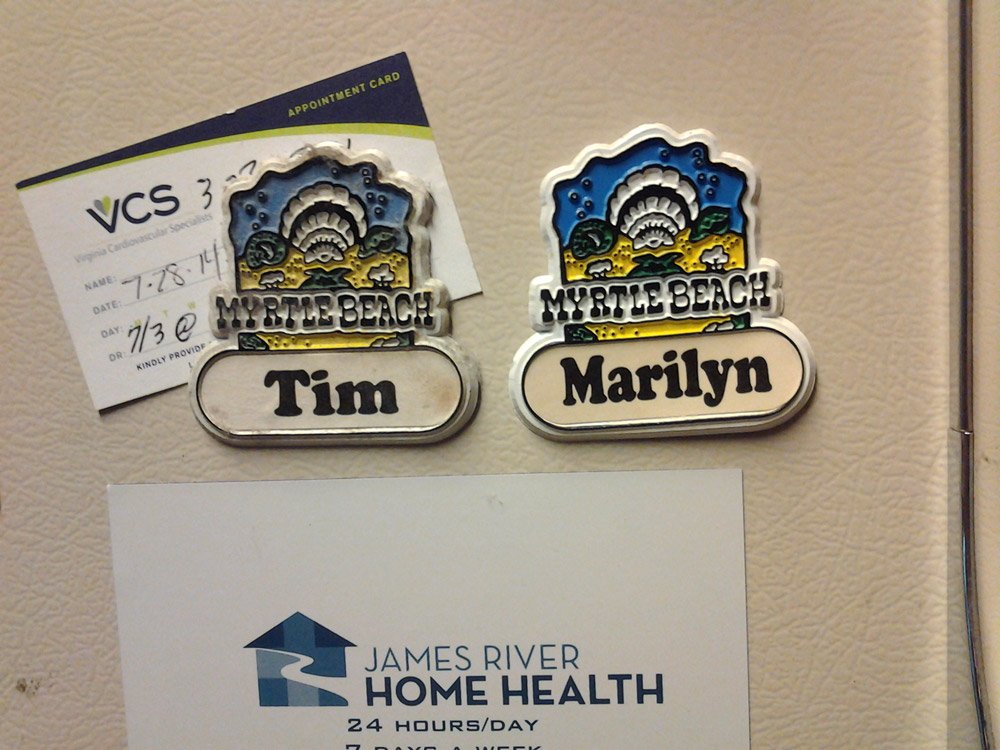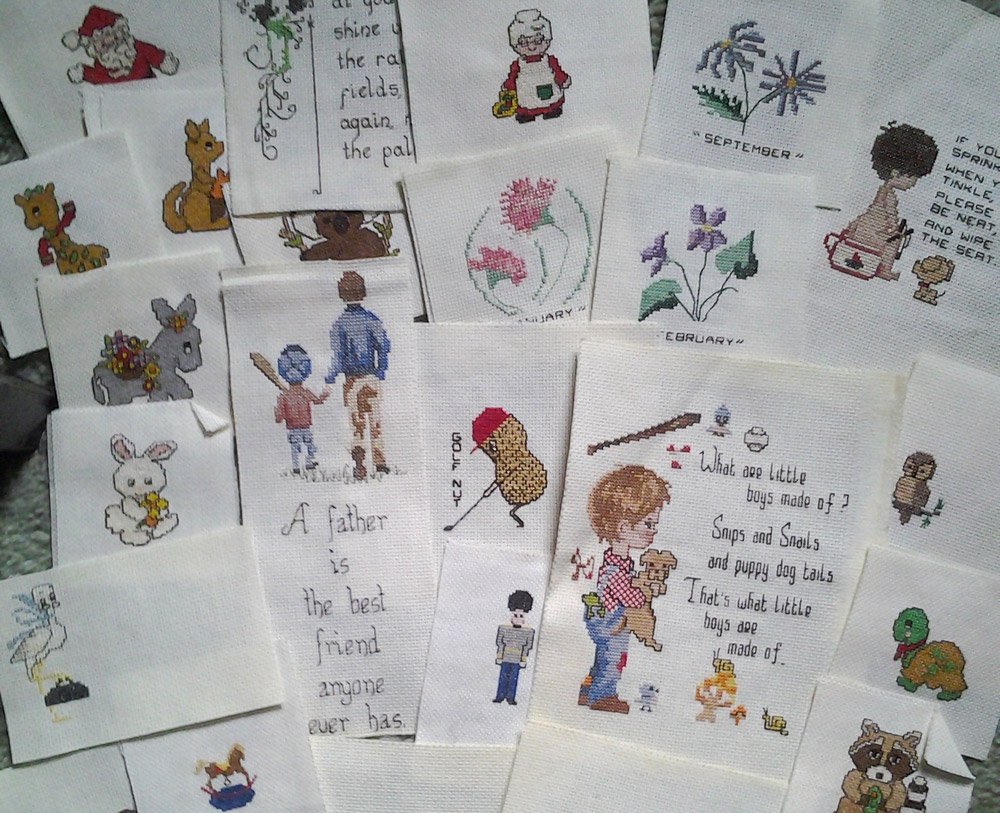
Beyond the obvious grief of losing a parent or relative to old age, there is a particular tragedy that accompanies a person’s passing rarely whispered inside the comfortable blandness of funeral homes or over the open caskets of the recumbent dead: the tragedy of discovering lives left unfinished and dreams unfulfilled while cleaning out the lingering personal effects of the departed. In my lifetime so far, I have sorted and removed the orphaned belongings from the homes of three people that have escaped their corporal lives: a woman in Boca Raton, Fl, whom I only knew as Mrs. Solomon; my cousin once removed’s father, William (Bill) Crumpler of Sandston, Va; and most recently, my ex boyfriend’s father, John (Tim) Carey of Midlothian, Va. On each occasion I was afforded an intimate study of their abandoned lives and found myself privy to secrets, and even shame, possibly never spoken to another soul.

In my employment as a professional organizer for the deceased, I’ve discovered that each person’s home relates a rambling story about their lives: from the “Viva Las Vegas” shot glass in the liquor cabinet to the Myrtle Beach refrigerator magnet, that both speak of vacations and travel, to the more cherished keepsakes like family photos and albums or the correspondence of letters found in holiday cards and tucked out of sight, every object leaves evidence about the quality and condition of a former life now concluded. Since I tend to be a sensitive individual, I occasionally stop to examine and set aside any sort of personal belongings I think may have meaning to the surviving relatives. For example, when leafing through one of Mrs. Solomon’s books, I discovered a faded envelope wedged between pages that contained a special Valentine’s telegram sent to her from her husband during World War I. When it was later conveyed to Mrs. Solomon’s son, I was told that he wept and expressed gratitude as he stood reading the simple, one-sentence sentiment contained in the telegram. For all I know, he never knew his dad and had lost him in the war.
When I cleaned my second house, Bill Crumpler’s home, I discovered that people’s daily habits and routines are also unflinchingly exposed by the gradual erosion of surroundings in their homes. Bill, a widower, spent the decline of his life either sitting on his back porch coaxing cardinals to feed from the palm of his hand or parked in an easy chair while watching TV in his living room. The blue easy chair, a stained and careworn revenant, was backed into a corner of the living room, and when I wrenched it from its resting place against the wall, it revealed a shocking inverse shadow of bright, white wall starkly outlined by a halo of accumulated cigarette smoke. Tim Carey, meanwhile, had worn a rut into his hall carpet and also shuffled bare the wood flooring in his kitchen and dining room. The trail of bare wood through the middle of the otherwise finished floor reminded me of the bent grass and depressions that denote the trails of deer through a field.
I’ve also encountered odd instances of hoarding — or maybe it’s a lifetime of collecting — in people’s homes. Mrs. Solomon possessed a vast collection of beaded necklaces that festooned her bedroom doorknobs, and I dreamed of transforming them later into some craft project; and in a dresser drawer in the Carey house, I discovered several boxes of wood matches, two dozen unused cigarette lighters purchased in bulk, and a well-curated collection of restaurant match books. It was easy to conclude that somebody had been a chain-smoker, though when I was acquainted with Mr. Carey, he did not smoke. So I asked my ex about it, and he told me that both his mother, Marilyn, and his dad had smoked. And even though his mother’s death was over a decade in the past and the odor of smoke had long been banished from the walls and furniture, still the dark-stained kitchen cabinets yellowed my cleaning rag when I wiped them and revealed years of smokey build-up — a sign that Tim had never tended to them since Marilyn’s passing.
I confess that part of the reason I clean out homes vacated by the dead is the prospect for potential looting. Typically, an estate is pillaged shortly after the owner’s death, but it is the cleaners who sort through the refuse and discover the hidden treasures. When I cleaned Bill Crumpler’s home, I was told I could keep whatever I found (save family photos), and the same was true with Mrs. Solomon’s modest estate. Bill’s house sat vacant for a year because his son could not bring himself to sort through his father’s possessions, and it yielded very little in the way of treasure. I learned from my cousin that Bill had invited his granddaughter and great granddaughter to live with him for while, but apparently Terry and her on-again off-again boyfriend were both drug addicts and had absconded with anything of value from the house long before I arrived. All I netted were a few video games for the GameBoy and an exclusive Pikachu edition of the Nintendo 64 console. The little girl’s room had contained only the molded wreckage of her dolls, toys and various grade school papers and reports.
And so too, Mrs. Solomon’s son and daughter told me to remove, by the most convenient means, everything I found in her Florida condo, but since her tastes were vastly different from my own, I collected only some kitchen gadgets, a complete set of flatware (my first ever), some books and the aforementioned collection of beaded necklaces. I had thought that certainly Mrs. Solomon’s children would want the furnishings or housewares, but when I arrived for the first time at her home, I found it nattily appointed with the gold, brown and orange furniture so popular in the 1970’s and understood at once why they had no desire to keep any of it. Meanwhile, Mrs. Solomon also had several unused gifts among her belongings, and I found similar gifts in the Carey’s household — all in their original boxes with tags still attached.

Among the homes of the elderly, I typically encounter stockpiles of pills and prescription medications, and I’ve learned that, depending on which state you live in, sharing or passing on prescription drugs is illegal and is otherwise considered inadvisable. Once, I heard on the radio a story of a man in India who walks door to door through wealthy neighborhoods asking for discarded pills to pass along to the indigent, and I thought that I, too, could find some underground sharing circle for prescription drugs in America, but I had no such luck. At a farming commune I formerly called home, there is a medicine chest stocked with both current and expired prescription drugs left by visitors, and I thought of sending Mr. Carey’s prescription drugs there, but finally I accepted that waste is an inevitable fact of people’s departures and put them in the trash instead.
The amount of waste generated in a person’s lifetime can be rather depressing: In Bill’s shed I found stacks of fifteen year old roofing shingles, still new, that ended up in a rented dumpster outside the house. In the Carey home, I found obsolete electronics like two, decade-old Dish TV receiver boxes, a functioning IBM Selectra II typewriter (it weighs thirty-five pounds if it weighs an ounce), and a VCR with shelves of recorded TV shows on old VHS tapes – now slated for a trip to the county landfill. Tim’s wife, Marilyn, had left a legacy of belongings that reflected her skill set: a well-organized sewing case with pre-loaded bobbins and spools of thread — even some special-order garment tags bearing the legend “Handcrafted by Marilyn”. And in the hall closet, I discovered a stack of cross-stitch patterns photocopied from some craft book and now a relic of the past thanks to the Internet with its archives of downloadable patterns. And then there were the garbage sacks full of clothes, belts and shoes headed to the nearby Goodwill store; at least clothing has some chance of being repurposed as rags or finding a new owner, but Tim’s clothes were too big for most people to wear — the result of a man in the last years of his life enjoying high-calorie foods despite the type II diabetes that ultimately contributed to the end of his life.

I suppose the summation of my experience with cleaning homes is a sadness at seeing so many parts of lives left unfinished. It’s a bit of a downer to see so many incomplete projects and lesser dreams laying about with no hope of completion, like a stack of unmounted cross-stitch pieces in Marilyn’s craft bag, contrasted with the grim realities of day-to-day living: a letter box filled with fat, over-stuffed envelopes containing unread Medicare benefit manuals alongside crisp, tri-fold financial statements from an investment portfolio with the margins bearing Mr. Carey’s shaky handwriting where he performed some quick math. People grow old and let go the trailing threads of life’s loose ends, but do they intentionally abandon old projects as their end draws near or is it the result of distractions from multiple physician visits each week, hospitalizations and mornings filled with extensive pill regimens? I suppose each case is unique, and in time I will find an answer of my own.
So there are lessons to be learned as well as fragments of joy to be found in the wasteland of life’s aftermath. I am only five days into cleaning Mr. Carey’s home, and already I have excavated a bank envelope filled with hundred dollar bills from a kitchen drawer. I watched with excitement as my ex counted the money in front of me: it totaled exactly $1000. Apparently his father, like so many people, had left a stash of cash for emergency use — my friend, Ali, calls it “mad money”. Meanwhile, my own life is burdened with stacks of storage bins that contain all manner of seashells, rocks, stamps, graphic novels, video games and toys that will eventually become the legacy of my estate. Hopefully, friends will remember my works and my deeds rather than the clutter I leave behind, but scattered among my collections are a handful of items from the homes of Mrs. Solomon, Bill, and Tim that speak to me from time to time and whisper their inaudible wisdom, “Memento mori.”
–Spriggan Radfae
Follow us!Share this post with your friends.
